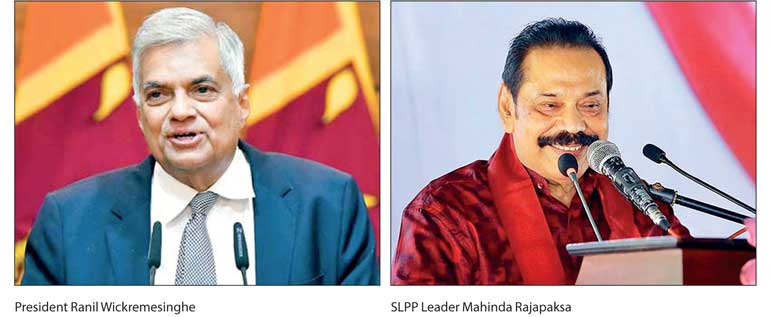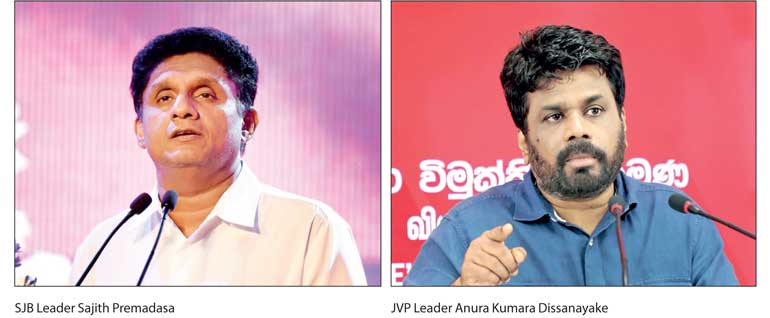Monday Feb 16, 2026
Monday Feb 16, 2026
Wednesday, 17 May 2023 00:05 - - {{hitsCtrl.values.hits}}


The Left can and should engage with the technical question of debt restructuring while thinking about a much wider project to redesign the economy with egalitarian principles in mind. This task is especially urgent when a country such as Sri Lanka is trying to emerge from an economic crisis while grappling with the failure of the previous model that led to the breakdown
 Less than a year has passed since the 9 July uprising last year in Sri Lanka. Nevertheless, the contours of the present regime are well established. The Government led by Ranil Wickremesinghe and backed by the Rajapaksas’ Sri Lanka Podujana Peramuna (SLPP) is leveraging an agreement with the International Monetary Fund (IMF) to force regressive “reforms” on state and society. That includes imposing severe costs on working people especially, through a severe austerity program. However, while the Wickremesinghe-Rajapaksa Government enjoys the inherent advantage of incumbency, the reality is that its hegemony is extremely fragile. It continues to rely on a strategy of deception and delay to conceal its lack of a social base.
Less than a year has passed since the 9 July uprising last year in Sri Lanka. Nevertheless, the contours of the present regime are well established. The Government led by Ranil Wickremesinghe and backed by the Rajapaksas’ Sri Lanka Podujana Peramuna (SLPP) is leveraging an agreement with the International Monetary Fund (IMF) to force regressive “reforms” on state and society. That includes imposing severe costs on working people especially, through a severe austerity program. However, while the Wickremesinghe-Rajapaksa Government enjoys the inherent advantage of incumbency, the reality is that its hegemony is extremely fragile. It continues to rely on a strategy of deception and delay to conceal its lack of a social base.
In this context, whoever can seize on the regime’s weakness will ultimately benefit. Given the disorganised state of the Left, the nationalist Right maintains the advantage by default. The nationalist right speaks in the language of sovereignty. It talks about defending strategic assets and shielding “war heroes” from scrutiny, as opposed to social and class struggles. Instead of emphasising the costs of privatising essential services for working people, for example, the nationalist Right frames privatisation in xenophobic terms as a foreign conspiracy—these days American or Indian, but in the past, Chinese as well. Implicitly or explicitly, the nationalist Right reinforces the coercive powers of the state, which is bound up with the reproduction of capitalism.
Any truly progressive movement that aims to challenge these structures of power must prevent the discourse of self-sufficiency and policy autonomy from being appropriated in this exclusivist, nationalistic way. Instead, a progressive emphasis must focus on the struggles of working people, such as resistance to the rising cost of living. It must devise a solution through patient engagement with their organised representatives, such as trade unions. Meanwhile, in the absence of a progressive alternative, the re-emergence of fascism hinges not only on containing but also expressing the underlying frustrations with the system.
That includes the likely failure of the Left if it focuses narrowly on electoral politics. The current emphasis on the National People’s Power (NPP) gambit within some sections of the Left especially must not preclude the intellectual and organising work necessary to revive an actual social movement grounded in the working people. Only the latter can hold political parties accountable. Furthermore, an extra-parliamentary movement is necessary to resist the inevitable pressure from international forces and the ruling class that will come if a new Government tries to break with neoliberalism.
Such a rupture would not imply the immediate transcendence of capitalism, especially given the unfavourable global conjuncture. But it does involve a struggle between capital and labour, broadly defined. In general, that is what determines the shape of any temporary compromise that ushers in a new order. One example from Sri Lanka’s own past was the period of economic dirigisme and the search for international alternatives through Sri Lanka’s engagement with the Non-Aligned Movement, from 1956 to 1977. The precedent was the Great Hartal of 1953, which exposed deep popular frustrations and demands for change. These energies were contained and circumscribed by the nationalistic Sri Lanka Freedom Party (SLFP).
While there is no returning to the past, the idea is that the long 1960s in Sri Lanka nevertheless represented a break with Western hegemony in the context of rising national liberation struggles. Today’s global moment, of course, is also different. The chief danger now, in addition to inter-imperialist conflict, is the potential space for Far Right or fascist regimes to consolidate. Speaking to this question will shape the way in which the Left conceives an alternative, including resisting the nationalistic appropriation of self-sufficiency.
The Left may not be an active part of such an electoral coalition. But it could at least provide the ideological perspective capable of shaping its policies and forcing a quasi- progressive regime to accommodate its critique. This pragmatic perspective contrasts with the hard Right government currently in power, which paints dissent from the IMF agreement as treason
Left disorientation
Meanwhile, for the Left in Sri Lanka, it is not enough to ascribe its current weakness to the inevitable tendency of neoliberalism to disorganise the opposition. It also reflects a failure specific to the movement. Namely, its ideological disorientation. The Left no doubt will take time to recover its long-lost organising potential and grassroots networks, especially in places such as the rural South. But the problem is that the Left has yet to even produce an intellectual, no less than a political, vanguard capable of spelling out the failure of the Wickremesinghe-Rajapaksa government to actively confront the IMF in the interests of its own population.
Some now beseech the IMF to deal with “corruption” for example. But this is a convenient, self-serving explanation promoted by international institutions allowing them to ignore the decades of policy they supported encouraging the upward distribution of wealth. Instead, the Left must challenge the state. It must actively demand fiscal space, for example, for far more relief than the measly 0.6% of Gross Domestic Product (GDP) that has been allocated in this year’s budget. The Left must consider each statement it puts out from the vantage point of its ideological value in strengthening popular consciousness.
In theory, of course, we can always fall back on our principles, to say that the IMF’s austerity push must be opposed in general. But in practice, even this stance requires hard work to understand where and how the supposed negotiation can be pushed. For example, while the IMF is promoting fiscal consolidation, where has been the opposite emphasis on counter-cyclical spending – that is, policies to support economic recovery especially through jobs and incomes? Why have the IMF’s claims generally gone unopposed in the Sri Lankan public sphere, a few critical voices aside? Here we must contextualise past debates to identify the relevant distinction that can be used to critique the austerity push.
The neoliberals with their well-funded think tanks and experts have temporarily won the debate by delegitimising ‘loose monetary policy’ as an example of “money printing.” They did so by decoupling monetary policy from fiscal policy. Meaning, they obscured the need for an increase in government spending and a shift in where it must occur, to provide relief along with channelling investment into critical areas. Instead, there has been no guiding hand of public stimulus since the onset of the economic crisis. As a result, low interest rates, or cheaper borrowing, previously accommodated speculation. There was little productive investment through the government’s fiscal deficit. As was recognised long ago, trying to stimulate the economy through low interest rates alone is like “pushing on a string”. This is a principle that the previous government led by Gotabaya Rajapaksa failed to recognise. It chose to ignore actual spending measures for revival.
A similar paradox now affects Western countries, where Central Banks are trying to use interest rate hikes to weaken labour and suppress demand. These measures are also provoking financial instability because of the previous boom in the issuance and purchase of speculative assets, such as junk bonds. This took place in the context of a low interest rate environment that lacked tighter regulations on financial speculation along with redistributive public spending.
Separately, as a growing number of critical economists in the West are arguing, raising interest rates will do little to solve the underlying factors driving the rising cost of living. That includes the critical need for investment to deal with supply constraints along with windfall taxes on corporations that are using these to justify indiscriminate price increases. Finally, as economists such as Jayati Ghosh have pointed out, financial tightening in the core countries threatens to derail development in the global South by dramatically raising the costs for servicing external debt.
In the case of Sri Lanka, the interest rate hikes have been based on incorrect assumptions about the reason behind rising prices. Mainstream experts argued that these were caused by too much demand, when they were in fact the result of exogenous factors that made imports more expensive, such as the war in Ukraine. Moreover, the rate hikes have made the situation even worse by increasing the costs of borrowing for small and medium enterprises along with working people who have been forced to pawn personal assets to survive. The hikes reflect wrongheaded macroeconomic assumptions about the need for forced savings to finance investment. However, in practice, this supposedly neutral methodological claim has become an ideological justification for wage repression. In this case, “savings” or the decline in working people’s real incomes, are absorbed through increased profits abroad, and through the consumption of elite rentiers at home.
Furthermore, the related IMF-designed constraints on government spending—the goal of a primary, or fiscal, surplus—will only aid global finance capital in its project to extract more value from Sri Lanka. They are meant to force the country to prioritise debt repayments in the absence of large haircuts on external loans. It is crucial to keep in mind that in this regard, the IMF recommendations of fiscal consolidation and interest rate hikes have already been implemented since early last year in the aftermath of the release of its Staff Report. The “brutal experiment,” according to the IMF’s Senior Mission Chief for Sri Lanka, was in fact part of the preliminary conditions for approval of a bailout agreement. The resulting economic contraction must be ascribed to a failure to provide immediate relief to people through an increase in government spending.
The approach to development in general would be one that views labour, as opposed to mere capital, intensification as the priority. Redistributive reforms in this context need not necessarily put further pressure on the budget either. They could also include measures to reduce domestic rigidities
Where is the negotiation with the IMF?
At the same time, for the Left to try again to win this debate and realise gains in practical terms also requires grappling with another set of issues. Sri Lanka’s policy autonomy is no doubt constrained. It must seek external financing to deal with its external debt, in addition to a long-term need for development financing. That will inevitably come with conditions. But the Left could argue, for example, that to whatever extent possible, any government sincere in its efforts to negotiate on behalf of its population must draw a redline with the IMF.
That includes explaining why immediate ‘fiscal consolidation’ (double-speak for austerity), especially during an economic depression, is flat-out unacceptable. Perhaps the amount of government spending that could be authorised through an IMF agreement would not be unlimited. But it could surely include a threshold for a fiscal deficit that includes some amount of direct spending. This must include far more relief and investment in those areas vital to increasing domestic production for the purpose of reducing the import bill. Lower interest rates would be the necessary complement to these measures.
The IMF may reject such proposals, insofar as they contravene its core free trade assumptions. But at the very least the ideological confidence of the population would be strengthened. This approach could signal to the public that whichever Government in power that adopted it was sincere in its negotiation. More importantly, it could further develop the social consciousness of a people capable of demanding more redistributive measures, such as wealth taxes, if powerful international actors and the ruling class refuse a solution that accommodates working people’s needs for survival.
This attitude would be the real way of measuring the distance between the current Wickremesinghe-Rajapaksa government in power and any opposition that hopes to replace it with the promise of renegotiating—if not eventually being forced to reject—the IMF agreement. The Left may not be an active part of such an electoral coalition. But it could at least provide the ideological perspective capable of shaping its policies and forcing a quasi-progressive regime to accommodate its critique. This pragmatic perspective contrasts with the hard Right government currently in power, which paints dissent from the IMF agreement as treason.
Such a political program would also require going to the people. The purpose would be a debate not only about a set of policy demands, but a fundamental shift in the development model. That would mean one that brings into view the core needs of social reproduction. It would entail specifying the investments in the social sector needed to reduce the burdens on women and other frontline communities especially, which Niyanthini Kadirgamar highlighted in a recent article that was reproduced in the Daily FT (“How the economic crisis hit ‘home’ for Sri Lanka”). Measures should include, for example, higher incomes for care workers.
The approach to development in general would be one that views labour, as opposed to mere capital, intensification as the priority. Redistributive reforms in this context need not necessarily put further pressure on the budget either. They could also include measures to reduce domestic rigidities, as Michal Kalecki and successive development economists after him have noted. One possibility is a program for land redistribution that prioritises marginalised groups.
In this regard, for it to be effective, self-sufficiency must be articulated in progressive terms. A reactionary understanding of self-sufficiency—meaning, one predicated on ethnic, gender, and other exclusivist hierarchies—is useless if not dangerous. Furthermore, the Left can and should engage with the technical question of debt restructuring while thinking about a much wider project to redesign the economy with egalitarian principles in mind. This task is especially urgent when a country such as Sri Lanka is trying to emerge from an economic crisis while grappling with the failure of the previous model that led to the breakdown.
(This article, with a revised introduction, is based on an excerpt from “Left Strategy in the Time of the IMF Counter-Revolution,” published on the Social Scientists’ Association’s Polity website: https://ssalanka.org/polity-online/.)